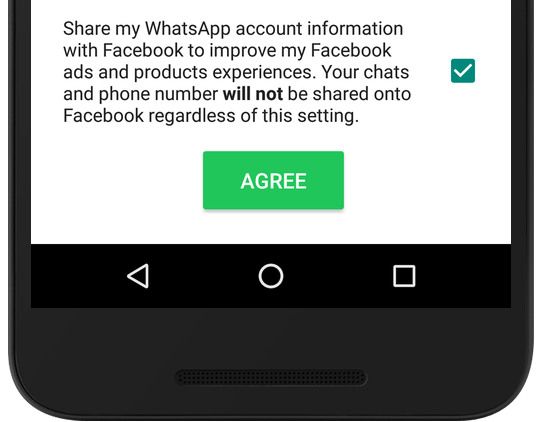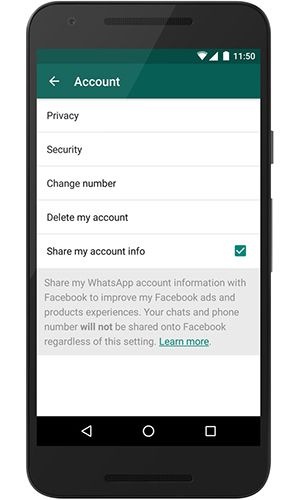When Facebook acquired WhatsApp over two years ago, it caused quite a bit of understandable concern over what Facebook's ownership meant for WhatsApp user privacy. Sure enough, when WhatsApp recently announced an update to its privacy policy, it revealed a more solid, and worrying, connection between WhatsApp and Facebook accounts.
In the announcement, WhatsApp explained what the data-sharing between Facebook and WhatsApp would mean for users:
By coordinating more with Facebook, we'll be able to do things like track basic metrics about how often people use our services and better fight spam on WhatsApp. And by connecting your phone number with Facebook's systems, Facebook can offer better friend suggestions and show you more relevant ads if you have an account with them.
What isn't included in the WhatsApp announcement is that you can actually opt out and not connect your two accounts or share your WhatsApp information with Facebook. This information is buried in the WhatsApp FAQ [Broken URL Removed], while a separate document where WhatsApp outlining some legal information explains:
If you are an existing user, you can choose not to have your WhatsApp account information shared with Facebook to improve your Facebook ads and products experiences. Existing users who accept our updated Terms and Privacy Policy will have an additional 30 days to make this choice by going to Settings > Account.
So if you haven't already accepted the new Terms of Service (TOS) and Privacy Policy, when you open up WhatsApp and are prompted to agree to the changes, tap the "Read more" link. At the bottom of that page, you should have the option to uncheck sharing your WhatsApp account information with Facebook.
If you have already accepted the updated TOS and Privacy Policy, go to your WhatsApp Settings > Account and toggle the choice at the bottom of the screen.
By choosing not to "improve your Facebook ads and products experience," as they so tactfully put it, means that you can't actually completely opt out of the new Facebook-WhatsApp connection.
The Facebook family of companies will still receive and use this information for other purposes such as improving infrastructure and delivery systems, understanding how our services or theirs are used, securing systems, and fighting spam, abuse, or infringement activities.
The changes have been met with tough criticism with European and British privacy regulators taking issue with the change, and saying that it should have been provided as an opt-in option rather than an opt-out one.
What do you think of the updated terms? Is Facebook going too far? Let us know in the comments.



